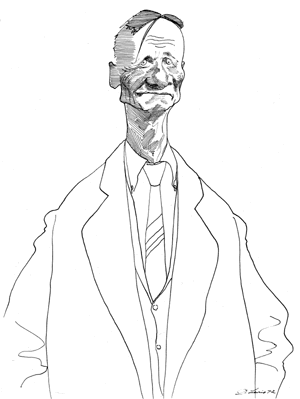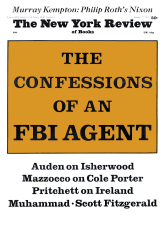In reading Mr. Isherwood’s latest book—since in it he always refers to himself as Christopher, I shall henceforth call him by his first name—it may be helpful to recall the three crises through which, according to Erik Erikson, anybody who merits an autobiography must pass: the crisis of Identity, the crisis of Generativity, and the crisis of Integrity. Roughly speaking, these occur in youth, middle age, and old age respectively, but they usually overlap, and the intensity and duration of each varies from individual to individual.
In the Identity crisis, the young man is trying to find the answer to the question, “Who am I really, as distinct from what others believe or desire me to be?” This is a crisis of consciousness. The Generativity crisis is a crisis of conscience. The question now to be answered is: “I have done this and that; my acts have affected others in this way or that. Have I done well or ill? Can I justify the influence that, intentionally or unintentionally, I have had on others?” Both the Identity and the Generativity crises are preoccupied with freedom and choice. The Integrity crisis of old age is concerned with fate and necessity. As Mr. Erikson puts it, it demands:
…the acceptance of one’s one and only life-cycle as something that had to be and that, by necessity, permitted of no substitutions, the knowledge that an individual life is the accidental coincidence of but one life-cycle with but one segment of history.
As I read it, Kathleen and Frank is Christopher’s attempt, wholly successful in my opinion, to solve his Integrity crisis. As he himself writes in his Afterword:
Christopher saw how heredity and kinship create a woven fabric; its patterns vary, but its strands are the same throughout. Impossible to say exactly where Kathleen and Frank and Richard and Christopher begin; they merge into each other…. Christopher has found that he is far more closely interwoven with Kathleen and Frank than he had supposed, or liked to believe.
And as he went on reading he made another discovery. If these diaries and letters were part of his project, he was part of theirs, for they in themselves were a project too….
By now Christopher’s project has become theirs…. For once the Anti-Son is in perfect harmony with his Parents, for he can say, “Our will be done!” Kathleen and Frank will seem at first to be their story rather than his…. Perhaps, on closer examination, this book may prove to be chiefly about Christopher.
Since I am Christopher’s junior by only two and a half years, I am bound, of course, to compare his situation with my own. Thus, I cannot imagine myself keeping a personal diary. In mine I enter only social engagements, lately the death of friends, when in the city, household incidents like getting the bathroom wash-basin unclogged, when in the country, natural phenomena like the weather, the first cuckoo, or the first strawberries. But then my professional preoccupation is with verse, not prose. With novelists it is evidently otherwise. It is a well-known fact that Christopher keeps a journal which his friends and admirers all look forward to reading some day. It now appears that he must have inherited this habit from his mother, for the core of his book is a diary which she started as a young girl and continued to keep until, in her seventies, a stroke made writing impossible.
The trouble for the reader of a diary who does not know its author personally is that he can only judge it, firstly, by its entertainment value—it must amuse him—and, secondly, by its historical value, the light it sheds upon the social mores and political events of the time in which it was written. I must frankly confess that, taken by itself, that is to say, without Christopher’s comments and explanations, I do not think Kathleen’s diary very interesting. For example, one expects from a diarist traveling in foreign countries vivid descriptions of the landscape and acute observations about the inhabitants. These Kathleen cannot provide. The only observation of hers that amused me was her preference—she was a stanch monarchist—for the royal splendor of Madrid to the “republican dullness” of Paris. When she does comment on public events, which is not very often, her remarks are too typical of her class to be considered her own.
What does, however, remain most impressive after one reads Christopher’s description of her parents, Emily and Frederick, is that she grew up to be so “normal,” not a wild neurotic, for both of them, it seems, were monsters. Emily, says Christopher, was
…a great psychosomatic virtuoso who could produce high fevers, large swellings and mysterious rashes within the hour; her ailments were roles into which she threw herself with abandon.
One is not surprised to learn that, in later life, Kathleen was so suspicious of “illness” that Christopher had almost to die of blood poisoning before he could convince her that he was not being hysterical.
Advertisement
Frederick was a possessive bully with a deplorable passion for photography. (Since I consider the two most evil technical inventions so far to have been the internal combustion engine and the camera, I must also deplore Christopher’s interest in the movies.)
In adolescence Christopher rebelled, very naturally, against Kathleen’s cult of the past, but I’m not sure that he realizes even now that this was no personal idiosyncrasy, that, had he been in her situation, he would probably have felt the same nostalgia. If she looked back on the early years of her marriage in Wyberslegh Hall as the happiest days of her life, what could be more natural? It was clearly a very cozy home, much nicer than Marple, and later, owing to Frank’s military duties, they had often to find temporary homes. Then, in 1915, she became a widow, and what widow can find much cause for rejoicing in either the present or the future?
Kathleen and Frank first met in 1893, their engagement was officially announced in 1902, they were married on March 12, 1903, and Christopher was born on August 26, 1904. Kathleen, it seems, had previously been in love with a young man, generally referred to as “The Child,” who jilted her, and neither she nor her friends expected her to get married. Their courtship was prolonged and not without its sticky moments. In the first place, Frank had very little money. Then the very fact that they shared many interests, e.g., literary, made it difficult for them both to decide whether it would not be better if their relationship remained one of brother and sister rather than husband and wife. Fortunately, they finally opted for the second, and it is clear that their married life was exceptionally happy.
Of the two, Frank was the odd character. Though by profession a soldier, Frank had a passion for music—he played the piano very well—play-acting, including playing female roles, and knitting socks, even when on duty. I would have expected his letters to be more “amusing” performances than they are, but it seems that only when telling stories or writing letters to Christopher could he really let himself go. Though he sometimes doubted if soldiering was his real vocation—shortly before World War I he seriously thought of resigning from his regiment—one’s final impression is that he was not a misfit in the army. There is, for example, no evidence that his personal tastes ever caused him social embarrassment in an officer’s mess. And in one letter, after complaining about his situation, he has to add:
However there are moments when one feels quite military. Did I tell you about the little man who rushed up to me the other day and told me that he had made enquiries of the sergeants in the Volunteers and he heard I was likely to be most popular—that what the men liked was a real officer who, when they came in from drill, said something which made their bosoms swell. I can’t imagine myself doing this at all!
Then, whatever motives he may have had for sometimes wishing he were a civilian, one of them was certainly not the fear of getting killed. The young Christopher wove a myth about his dead father as the Anti-Hero, but it is obvious that he must have been a very brave man. He first saw battle in the Boer War, when he might very early have got killed, in which case neither Christopher nor this book would exist. Luckily, he only caught typhoid fever and was invalided home. Then came World War I and in 1915 he was killed.
It seems clear that it was mainly from Frank that Christopher inherited his imaginative gifts. I’m sorry that he did not also inherit his love of music—Kathleen doesn’t seem to have been very musical. I am also sorry, as a good little Episcopalian like Kathleen, that he did inherit Papa’s addiction to esoteric religions: Frank took up theosophy and Christopher Vedanta. In the matter of religion, I think I was luckier in my youth than he was. I should guess that the church Kathleen attended twice on Sundays was Broad if not Low. My parents, fortunately, were High, so that my first experiences of divine worship were of exciting, dramatic rituals. I was even a boat-boy.
For selfish reasons I wish Christopher had said a little more about his experiences at St. Edmund’s School, Hindhead, where we first met in 1915. He was known to us then as “Beesh,” a contraction of Bradshaw-Isherwood, and I can personally vouch for his linguistic and imaginative precocity, for it was from his lips that I heard the first witty remark in my life. We were out together on a Sunday walk in the Surrey landscape. “God,” he said, “must have been tired when He made this country.” About our headmaster “Ciddy” he is not quite fair. It is true that, since they were cousins, their relationship was bound to be difficult. It is also true that Ciddy’s temperament was not of the kind that inspires affection in the young. I must say, however, that he was a brilliant teacher to whom I owe a great deal. Incidentally, last October I attended a luncheon in London at Which the guests of honor were Miss Mona and Miss Rosa, both, I am happy to say, in fine fettle.
Advertisement
I myself never saw either Wyberslegh or Marple, and the only member of Christopher’s family I ever met, outside of Kathleen and his younger brother Richard, was his Uncle Henry, about whom I once wrote a slightly improper poem.
His descriptions of the family and their life in Cheshire are, however, fascinating both personally and historically. Marple Hall was said to be haunted, and both Christopher and Richard had experiences there that were clearly paranormal, i.e., no rational explanation for them is convincing. About one point I am curious. Kathleen seems never to have accepted her father- and mother-in-law as friends: she always referred to them by their surnames. I cannot help wondering if the cause for this was not class consciousness. Her father, Frederick, was, or had been, in the wine business, that is to say, “in trade.” In England at that time both the landed gentry and the professional middle class looked down on those “in trade,” those in business or in industry, as being not quite gentlemen, however rich they might be.
I have two little bones to pick, one with the author, the other with his publisher. The narrative would be easier to follow if the former had provided genealogical tables and the latter had printed at the top of each page the year with which it is concerned.
A fine book though. I cannot imagine any reader, whatever his social background and interests, not being enthralled by it.
This Issue
January 27, 1972




